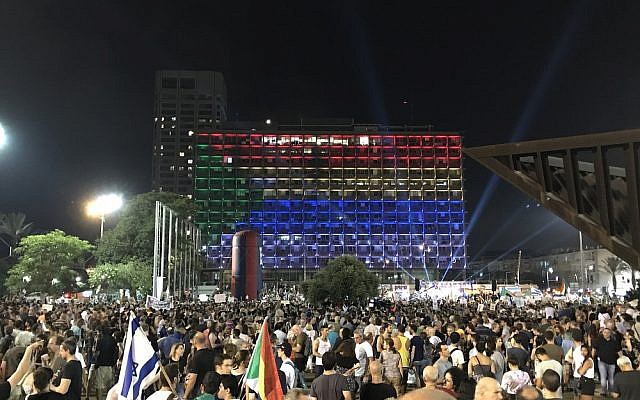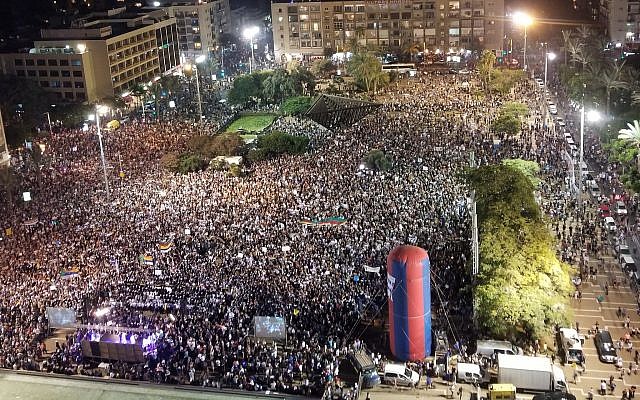A Jewish State for all its Citizens
"The recent passing of the 'Basic Law: Israel as the Nation-State of the Jewish People' has generated a wave of criticism in both Israel and abroad. Yet the law did little more than institutionalize not only the 70-year-long reality of Israel’s existence as a Jewish state in accordance with General Assembly Resolution 181 of November 29, 1947 but also the stipulation of the League of Nations, the UN’s predecessor, in the same vein."
"On July 24, 1922, the League recognized 'the historical connection of the Jewish people with Palestine' as 'the grounds for reconstituting their national home in the country' and appointed Britain as the Mandatory for Palestine, with the explicit goal of 'placing the country under such political, administrative and economic conditions as will secure the establishment of the Jewish national home.' Some 96 years later to the day, the Knesset echoed the League’s resolution, acknowledging the Land of Israel as 'the historical homeland of the Jewish people, in which the State of Israel was established' and defining this state as 'the national home of the Jewish people, in which it fulfills its natural, cultural, religious and historical right to self-determination'."
Efraim Karsh, director, Begin-Sadat Center for Strategic Studies, emeritus professor of Middle East and Mediterranean studies, King’s College London; editor, Middle East Quarterly
Shaul Bartal, research associate, Begin-Sadat Center for Strategic Studies
 |
"All our lives we took pride in an enlightened, democratic, and free state of Israel with the freedom and dignity of man as a supreme value. We never questioned the Jewish identity of the state."
"No one can teach us about sacrifice. No one can preach to us about loyalty. Military cemeteries and hundreds of fallen soldiers will testify to it. The same way we fight for the existence of the state, we are determined to fight for the right to live in equality and dignity."
"We are Israelis. We are brothers."
Sheikh Muafak Tarif, Druze spiritual leader, Israel
 |
| Druze demonstrators take part in a protest against 'Jewish State Nation Law in Rabin Square on August 4, 2018 in Tel Aviv, Israel. (Photo by Amir Levy/Getty Images) |
"The feelings of our Druze brothers and sisters touch my heart. I want to tell them: There is nothing in this law that infringes on your rights as equal citizens of the state of Israel, and there is nothing in it that harms the special status of the Druze community in Israel."
"The people of Israel, and I among them, love and appreciate you. We deeply appreciate our partnership and the covenant between us."
Israeli Prime Minister Benjamin Netanyahu
Famously, the devil is in the details. And when Israel a week ago announced its new basic law enshrining Jewishness as the spirit and soul of the State of Israel, it was fulfilling in essence, its original mandate, to build a home and a haven for the Jews of the world where they would find comfort and security because they are Jews in a Jewish world where no power can disrupt their sense of homecoming and their secure place in the world, in a nation that values and protects their interests as its purpose of existence.
On the way to becoming law, government waylaid its sense of obligation to and appreciation for those disparate communities within the greater community which has made sacrifices equal to those of Jews and who considered themselves to be equally committed to the State of Israel, for it was also their state, it was where their peace of mind, their lives and their livelihoods and their loyalty lay in every conceivable way. So while Jews celebrated the passing of the new law, the reaction of the Druze community offered sober second thought.
"It's enough of patting us on the shoulder and saying, 'You are our brothers, we love you'. There has to be full equality. We are the first to run into battle and the first to die on the flag. It's as if the Israeli people simply abandoned us. They say they didn't. But according to the clauses of this law, we don't exist", protested Shadi Nasraldeen, 45, a 26-year career in the IDF behind him. He now works at a national monument at Daliyat El-Karmel, a Druze village, dedicated to the over 420 IDF and security force fallen who happened to be Druze.
Those who carefully framed the wording of the new Israeli basic law affirming Israel as a Jewish state had a hard focus on Israel as a reborn nation risen from the ashes of ancient Zion twice sacked and destroyed, the Israelites sent into exile for thousands of years, its diaspora living all over the globe and wherever they lived viewed as inferior, subject to discrimination, persecution, violence and pogroms until the final and most horrendous of the atrocities eliminated one-third of international Jewry, six million of Europe's Jewish population.
Understandably, the emotional anguish of such a colossal catastrophe doesn't diminish with time; the existential threat lingers along with the incorrigibility of anti-Semitism worming its sinister pathology of deadly hatred wherever Jews live. The presence of a Jewish state -- the Jewish state, the sole haven on this planet for Jews -- is symbolic of universal salvation, a final rescue from the Angel of Death, from slander, humiliation, misery and historical reality of a people rejected. The euphoria of relief precluded extraneous thought of how that announcement would affect others.
And now it is known. The tiny Druze minority within Israel, totally loyal to the state and valuing with their lives their place within that state sees their security under threat, their sacrifices unappreciated, their future uncertain, so little wonder they now express the emotional harm being done their presence in Israel, their future aspirations. "The nation-state of the Jewish people" must now launch themselves into an exercise to correct the course taken that threatens to alienate the Druze community of 145,000 valued citizens and reverse the Druze interpretation of betrayal.
 |
| Protesters wave Israeli and Druze flags at Rabin Square during a demonstration in Tel Aviv against the nation-state law, on August 4, 2018. (Luke Tress / Times of Israel staff) |
Many Israeli Jews are appalled at the emotional harm being suffered by their fellow Israelis, a result of their being taken for granted, not realizing that their perception of abandonment and its devastating disappointment does no credit to the Jewish state. A large number of Israelis have launched an appeal for amendments to the law that would recognize the minority status of an exceptional calibre of people, to extend their status to full equality in every measure of the law as a just requirement for relations to be mended.
Druze, Circassians, Bedouin, Christians and some Arab Muslims qualify for the acknowledgement of their position inherent in a special category and that must receive formal and legal recognition in acknowledging their vital importance in achieving a Jewish state that reflects not only its Jewishness but its mutual dependency on those who have given it unqualified loyalty, considering themselves an integral and integrated part of the whole. They have more than proven themselves.
There can be no comparison between their communities' assimilation and those of the larger Israeli-Arab Palestinians who, despite citizenship, have a divided allegiance and whose faithfulness to the nation is fraught with tension and betrayal.
 |
| Tens of thousands participate in a Druze-led protest in Tel Aviv against the Jewish nation-state law, on August 4, 2018. (Adam Rasgon/ Times of Israel staff) |
Labels: Druze, Human Relations, Israel, Jewish State, Loyalty, Protests
0 Comments:
Post a Comment
<< Home